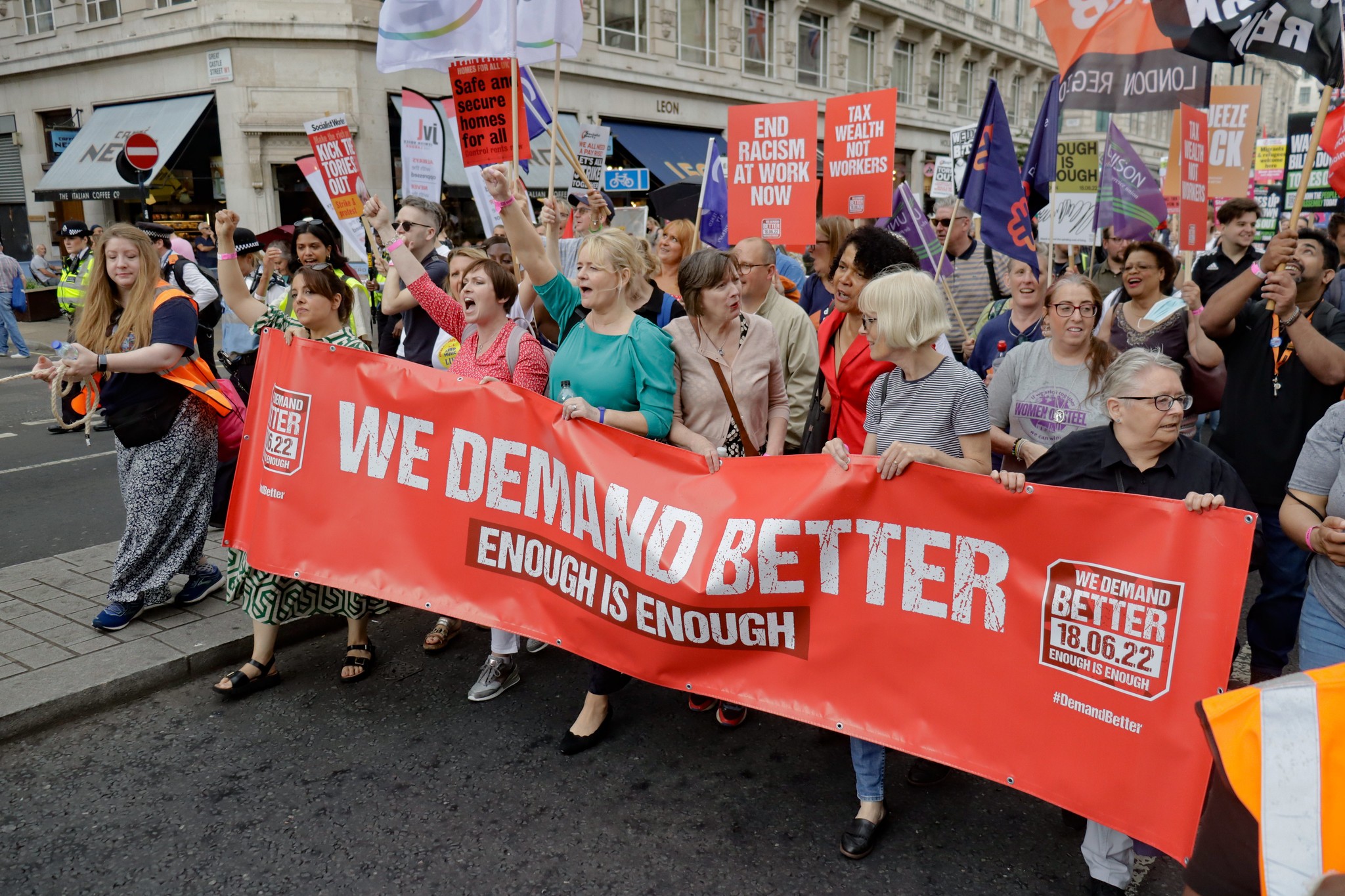Amidst growing industrial tension, the Trades Union Congress organized a rally at parliament square on the 18th of June. Although turnout was probably smaller than the organizers would have liked it achieved its main purpose: it got a lead on BBC news bulletins and was the first public rally held by the TUC since Covid, which helps in keeping the muscle memory going.
It also demonstrated the broad character of the movement. Rather than being confined to the workplace, there were many examples of political diversity. For instance, Mark Serwotka highlighted PCS’ role in challenging the Home Office’s deportations to Rwanda, the many fringe groups there (such as the Breakthrough Party and Socialist Party) attempted to disseminate political material, the Progressive Economic Forum used the opportunity to promote their recent report on the £15 minimum wage. While there are no doubt many in the trade union movement who would rather that these groups were not present, they serve as an important reminder of the movement’s many facets.
The rally gave general secretaries a chance to make speeches that both played to the gallery and hinted at the more complex nature of the internal politics of their unions. More eye-catching was the fact that, alongside trade union paid officials, there were also lay representatives given a platform to talk about their experiences and add authenticity in how they described the experiences of many workers.
Arguably the most significant development on the march was that it highlighted that underneath the variety of work, there is commonality to workers themselves. Nearly all the TUC affiliated trade unions were present; thus, the economy was represented in its multiplicity. What binds these unions together is that their members are afflicted by the same problems; the most pressing is pay, but there are others such as security and agency. Strip away the specific form of the job and the underlying relationships, the terms and conditions of the jobs are the same. If work is central to our society, then workers should be able to organise for representation.
However, trouble always finds workers as demonstrated by Mark Dickinson, general secretary of Nautilus, speaking about the mass firings at P&O and observing that this incident had briefly brought his union into the limelight alongside the more infamous RMT. There is a sense that P&O was not the first and won’t be the last case with very troubling implications for workers, regardless of their line of work. Just as P&O fired most of its workforce, so too did Phoenix Dance theater attempt to do the same with Equity members in May. To paraphrase Gresham’s Law, bad employment drives out good employment.
Currently, the economic climate and state of organised labour are such that workers and their unions are united by more than divides them. While they might have different quirks and methods, the goal of all the trade unions is the same. Paul Fleming, General Secretary of Equity, phrased the commonality of workers’ struggles best when he said of Equity members:
‘‘Our members share those struggles and so we share the answer; because demanding better isn’t about the things that we deserve, it’s not about that bare minimum… it’s about a shared vision of better…Every trade union is there to ensure that its members can be artists, and can live as artists.”
The effort, in the current conditions, is how to best put their aims to practice. “This is only the beginning” TUC General Secretary Frances O’Grady said, and it is the rest of the trade union movement that will decide to what extent that is true.
The rally came at an opportune time. Much of the current media attention is on the RMT and the ongoing rail dispute and it is being covered as the start of a ‘Summer of Discontent’ (showing that banality and unoriginality go hand in hand). However, this dispute will not be that informative for the looming public sector disputes including teachers, nurses, doctors, and civil servants which will most likely take place after the summer. Indeed, the RMT is a bit of an outlier, not just because it is well practised at industrial disputes, but because the strategic importance of the railways to the country’s economy gives it stronger leverage than most unions enjoy.
It is currently not clear to what extent industrial action shall materialise in the public sector (balloting thresholds could make it hard for some unions to secure strike action). Should action take place then the question shifts to how effective it will be and what will the reaction be. It is a critical moment for organised labour, either it will demonstrate that it is up to the task or it will not. Crisis provides opportunity and peril in equal measure. History is shaped by the victors, and if organised labour goes on to enjoy a resurgence in the coming months, securing victories for workers and reasserting its place in society, then this rally will be looked upon fondly as the start of that resurgence. If not, then it will fade from memory and be consigned to insignificance.


